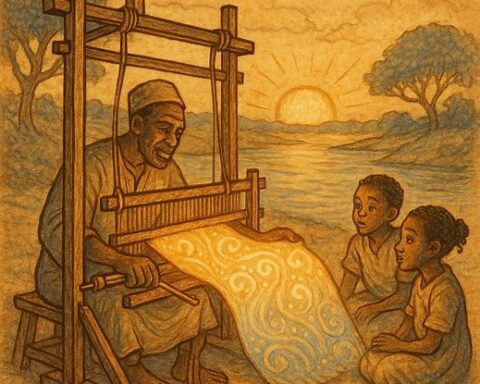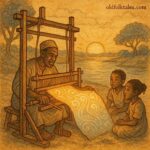Long ago, in a quiet West African village, there lived a poor peasant woman. She had many sons, and most of them grew up to live useful, hardworking lives. They were respected in the community, and their mother loved them dearly. Yet one of her children was unlike the others. This last son was born a fool.
He had little sense, and the villagers laughed at him constantly. He wandered about aimlessly, often hungry and neglected, left to shift for himself as best he could. Despite this, he survived, always lingering near the farms or the marketplace, observing life in his own strange way.
One afternoon, while the woman worked in her small garden, she stumbled upon something extraordinary. Lying beneath a large tree was a baby with very long hair, crying and kicking as though abandoned. The poor woman’s heart was filled with compassion. The child looked hungry and weak. Without hesitation, she picked it up, fed it, and nursed it back to health.
She waited anxiously, expecting someone to come looking for the child. But when night fell, no one appeared. Out of kindness, she took the baby home. Days passed, yet nobody came to claim it. At last, thinking it strange for a child to have such long hair, she cut it short.
The very next morning, a troupe of fairies arrived in the village. They claimed the baby as theirs and demanded it be returned exactly as it had been found. Since its hair had been cut, they declared this impossible. Angrily, they announced that the woman must be punished with death.
The villagers were horrified. The elders pleaded with the fairies, offering gold ornaments, slaves, and land in exchange for the woman’s life. But the fairies refused all gifts. They remained adamant: the woman must die.
Her sons wept bitterly, but there was nothing they could do. At sundown, the fairies gathered in the square, ready to carry out her execution. Just then, the neglected fool her outcast son, stepped forward.
Everyone laughed when he approached, for what wisdom could a fool possibly have? But the young man raised his hand and spoke boldly:
“Listen to me,” he said. “The fairies walk across our land every day, leaving footprints everywhere. Before they punish my mother, I demand that they erase every single footprint they have made in this village.”
The villagers gasped. To them, it sounded like nonsense. Yet the fairies, bound by pride and by the fool’s challenge, agreed. They believed it would be simple.
The next morning, the fairies began to rub out their footprints. All day they worked on a patch of sandy soil, smoothing the earth where they had walked. But as soon as one set of footprints disappeared, another appeared somewhere else.
Two days passed. Then a week. And another. Still the fairies labored, but no matter how much sand they smoothed, new footprints always appeared. The task was endless, for they could never undo all the paths they had walked.
Finally, exhausted and defeated, the fairies gave up. They released the woman and allowed her to live.
From that day forward, the villagers no longer mocked the fool. They saw that wisdom often hides in unlikely places, and sometimes the one who seems useless may save everyone with an unexpected idea.
Moral Lesson of The Wise Fool
The story of The Wise Fool teaches us that true wisdom is not always found where people expect it. The poor son, neglected and laughed at, turned out to be the one who saved his mother’s life. This reminds us that we should not despise or cast out those who seem different. Every person has value, and sometimes those considered weak or foolish may hold the greatest wisdom.
Knowledge Check: The Wise Fool
Who was the central character in The Wise Fool and why was he considered different from his brothers?
The central character was the mother’s last son, who was considered a fool because he lacked sense and lived neglected while his brothers lived useful lives.What unusual discovery did the mother make in her garden?
She found a baby with very long hair lying under a tree, crying and neglected.Why did the fairies want to punish the woman?
Because she had cut the baby’s hair, making it impossible to return the child to its original state.What clever demand did the fool make to save his mother’s life?
He demanded that the fairies erase every footprint they had ever made in the village before carrying out her punishment.Why did the fairies eventually give up?
Because each time they erased one set of footprints, new ones kept appearing, making the task endless.What important lesson does The Wise Fool teach about people society may reject?
It teaches that those who are overlooked or despised may still hold wisdom and value, and should not be cast out unfairly.Cultural Origin
This folktale, The Wise Fool, comes from West African oral traditions, where stories are passed down to teach lessons about justice, compassion, and the hidden wisdom of unlikely people.






